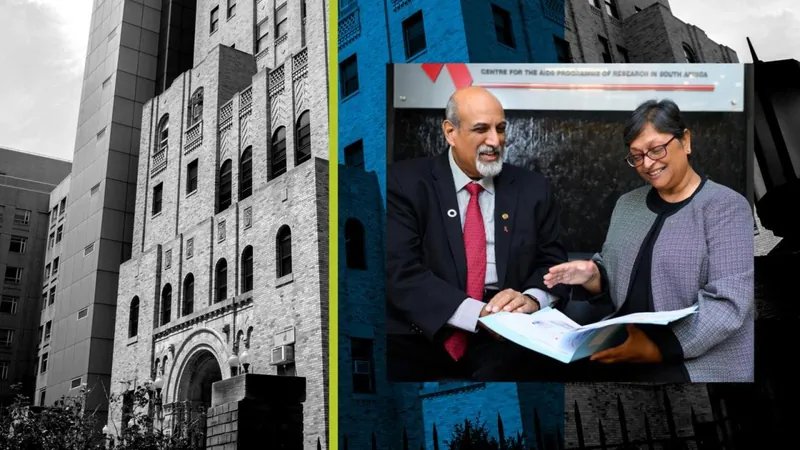
Groundbreaking Duo Quarraisha and Salim Abdool Karim Honored with Prestigious 2024 Lasker Award
2024-09-19
Author: Ming
In a momentous announcement today, the Lasker Foundation revealed that esteemed researchers Quarraisha Abdool Karim and Salim S. Abdool Karim have been awarded the 2024 Lasker~Bloomberg Public Service Award. This recognition is in appreciation of their unwavering commitment to combating the HIV/AIDS epidemic and for their phenomenal advocacy efforts that resonate throughout Africa and beyond.
The Abdool Karims are not just researchers; they are pioneers in the field of AIDS research, with a significant focus on the HIV epidemic in South Africa. Their work delves into factors influencing HIV transmission among adolescent girls and the development of sustainable antiretroviral therapy strategies for resource-limited environments. The foundation commended their innovative research and policy initiatives that have significantly improved lives at a global scale.
Professor Salim Abdool Karim, a distinguished figure in global health, serves as the CAPRISA Professor at Columbia University’s Mailman School of Public Health, while also directing the Centre for the AIDS Program of Research in South Africa (CAPRISA). His vast experience includes leadership roles in multiple respected health organizations, solidifying his reputation as a leader in public health.
Quarraisha Abdool Karim, also an accomplished public health expert, holds notable positions both at Columbia University and the University of KwaZulu-Natal in South Africa. She has been a pivotal force in driving vital research initiatives and education within the scientific community.
Together, this remarkable couple has battled various challenges within their field, including societal stigma and misinformation surrounding HIV/AIDS. Their courageous work has been transformative, enabling the introduction of life-saving antiretroviral treatments and empowerment programs that focus on women’s health, addressing the disproportionate impact of HIV on female populations.
One of their landmark contributions was the groundbreaking CAPRISA 004 study, which demonstrated that the use of tenofovir gel could significantly reduce HIV infections among women. This research was pivotal in leading to the development of Pre-Exposure Prophylaxis (PrEP), a revolutionary advancement in HIV prevention endorsed by the World Health Organization. Their findings have not only contributed to the global fight against AIDS but have also transformed how healthcare systems manage HIV and tuberculosis co-infections.
The Abdool Karims have not rested on their laurels; they tackled the SARS-CoV-2 pandemic head-on, conducting rapid epidemiological surveillance and promoting public health strategies against misinformation regarding Covid-19 vaccines. Their proactive role in the national response to the pandemic in South Africa has underscored the importance of clear, science-based communication during public health emergencies.
Additionally, their contributions extend far beyond research; they have been integral in training over 600 African researchers through the Fogarty International Center's programs. Their prestigious memberships in various scientific academies and their roles as advisors to critical global health organizations further illustrate their impact on public health.
In receiving the Lasker Award, the Abdool Karims emphasized the urgency of transparent scientific communication in an era rife with misinformation. Dr. Linda P. Fried, dean of Columbia's Mailman School of Public Health, expressed pride in their recognition, acknowledging their relentless efforts in advancing treatment and prevention strategies for infectious diseases.
This prestigious Lasker Award will be presented at a gala ceremony in New York City on September 27, 2024. The Lasker Foundation, established in 1945, continues to highlight key achievements in biomedical research, and this year's winners serve as a powerful reminder of what can be achieved through dedication and innovation.
Stay tuned as we continue to cover the incredible achievements of these remarkable scientists, whose relentless commitment to public health aims to change the world. Will they lead us to a future free of HIV/AIDS? Only time will tell.


 Brasil (PT)
Brasil (PT)
 Canada (EN)
Canada (EN)
 Chile (ES)
Chile (ES)
 España (ES)
España (ES)
 France (FR)
France (FR)
 Hong Kong (EN)
Hong Kong (EN)
 Italia (IT)
Italia (IT)
 日本 (JA)
日本 (JA)
 Magyarország (HU)
Magyarország (HU)
 Norge (NO)
Norge (NO)
 Polska (PL)
Polska (PL)
 Schweiz (DE)
Schweiz (DE)
 Singapore (EN)
Singapore (EN)
 Sverige (SV)
Sverige (SV)
 Suomi (FI)
Suomi (FI)
 Türkiye (TR)
Türkiye (TR)